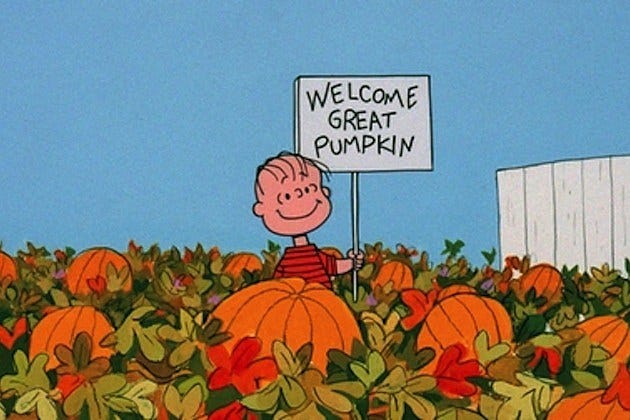Hi friends,
This week our dishwasher is on the fritz, which has led to much handwashing and also much discussion of how much harder this would be if seven people still lived here.
Our first house didn’t have a dishwasher, until one day we saw one by the side of the road. Someone was getting rid of an older model as they upgraded their kitchen. It had a sign taped to it: “STILL WORKS.” We packed it up and brought it home. With two babies in the house, I was so grateful for that raggedly old machine as it rumbled to life inside the hole in the cabinets cut by my husband.
The Part Where There’s an Essay: The Great Pumpkin and the True Meaning of Christmas
(Is anyone watching “It’s the Great Pumpkin, Charlie Brown” this month? This was originally published in 2017 on Story Warren.)
A few weeks ago, we did our traditional visit to the pumpkin patch, followed up by a family viewing of “It’s the Great Pumpkin, Charlie Brown.” This viewing was made even better by a friend who joined us that night, who couldn’t remember having ever seen the cartoon. It was sweet to make the introduction to him. “Great Pumpkin” will never surpass “A Charlie Brown Christmas” for me, but it’s very dear to my heart, mostly because so much of the story centers around Linus.
Linus, Lucy’s little brother, that blanket-toting, pure-hearted boy, is sure that the Great Pumpkin will rise out of the pumpkin patch come Halloween night. In the face of protests from Charlie Brown and other friends, and even his own sister’s threat that she will “pound” him, Linus carries on in his sincere belief that the pumpkin will appear. Only Sally, Charlie Brown’s little sister, supports Linus, but it’s mostly because she is smitten with him.
He carries on in his ‘sincere belief’ — sincerity is the word of the day for Linus.
Each year, the Great Pumpkin rises out of the pumpkin patch that he thinks is the most sincere. He’s gotta pick this one. He’s got to. I don’t see how a pumpkin patch can be more sincere than this one. You can look around and there’s not a sign of hypocrisy. Nothing but sincerity as far as the eye can see.
The Great Pumpkin never appears, and as the night wears on, Linus’ friends mock him. Sally deserts him, angry that she has missed trick or treating with the rest of the gang. As everyone retreats to their homes for the night, Linus promises to put in a good word for them with the Great Pumpkin “if he comes.” “If”?! Linus panics. He should have said, “When!” He’s terrified that the Great Pumpkin will pass him by because he gave the tiniest indication of doubt.
For me, even though “Great Pumpkin” was released after the Charlie Brown Christmas special, Linus’ trials and tribulations with the Great Pumpkin are a nice forerunner to his mountaintop moment in “A Charlie Brown Christmas.” You probably know that moment well: fed up with his friends’ materialism and competition over the Christmas holiday, Charlie Brown exclaims, “Isn’t there anyone who knows what Christmas is all about?”
Linus quietly assumes the stage, calls for the lights to be dimmed, and recites Luke 2:8-14.
And there were in the same country shepherds abiding in the field, keeping watch over their flock by night.
And, lo, the angel of the Lord came upon them, and the glory of the Lord shone round about them: and they were sore afraid.
And the angel said unto them, Fear not; for, behold, I bring you tidings of great joy, which shall be to all people.
For unto you is born this day in the city of David a Savior, which is Christ the Lord.
And this shall be a sign unto you: Ye shall find the babe wrapped in swaddling clothes, lying in a manger.
And suddenly there was with the angel a multitude of the heavenly host praising God, and saying,
Glory to God in the highest, and on earth peace and goodwill towards men.
“…That’s what Christmas is all about, Charlie Brown.”
Cue the tears. Little Linus, alone in the spotlight, has bravely stood against the tide of selfishness in his friends and made the point: Christmas is not about you. It is about an event — in Bethlehem. It is about a person — Christ the Lord.
Could it be that Linus’ willingness to believe in the Great Pumpkin laid the groundwork for his understanding of the true meaning of Christmas? I say yes.
When it is serving us correctly, fiction serves as a scaffolding for truth. Imagine scaffolding for a moment: it provides a framework for people to get higher. It is not the building itself. Compared to the strength of the building, it’s a temporary structure. But it serves an important purpose. (More on scaffolding here at Living Books Library)
Fiction can lay the groundwork for faith in a positive but subversive way. It interacts with our imagination. It links our head and our heart. It helps us to imagine a world we don’t see in front of us. Isn’t this what true faith does: causes us to live for a world we cannot (but will one day) see?
Fiction can also help us wrestle through difficult, abstract theological truths. I’ve seen my own children use fiction to get their arms around the nature of God. One of my favorite examples of my own kids’ grasping at truth in this way came a few years ago. We were reading a chapter of Proverbs one morning, and my middle son commented on the following verse:
Do not say, “I will repay evil”;
wait for the LORD, and he will deliver you.
Proverbs 20:22
He said, “That reminds me of The Lord of the Rings, when Gandalf says ‘A wizard is never late, nor is he early; he always arrives precisely when he means to.’” (Tolkien purists, my apologies — this quote is in the film only, not the book.)
What my son was doing in that moment was trying to get his arms around what it means to wait for a sovereign God. You might feel a little like Frodo — confused, and knowing you wouldn’t choose it to be that way, but ultimately trusting Gandalf’s character and history of keeping his promises.
Similarly, Linus’ eagerness to believe in the Great Pumpkin, despite his friends’ cynicism and outright hostility, lays a good groundwork for his faith. He is open to wonder. He desires sincerity, a feat that is downright noble in our age filled with sarcasm and skepticism. He is willing to believe in the supernatural.
But consider the difference between his “belief” in the Great Pumpkin versus his belief in the true meaning of Christmas. In October, he is frantic, nervous — he’s afraid if he says the wrong thing, he’ll get passed over. In December, he is settled, quietly confident that he knows the truth.
This Christmas, we as parents ought to focus on the One Great Story. But let us not fear entering into lesser stories. These smaller stories, when they are allowed to do their work, serve us and allow children to access that One Great Story.
Merry Christmas, Linus. And thank you.
For the Anglophiles
We love the quiet little show Detectorists — if you haven’t seen it, it’s a cozy pick for fall and winter. Since we watched it, I pay more attention to stories like this one: “Fields of dreams: a detectorists’ holiday in Suffolk.”
“The final tally comprised 10 Roman coins including minims, denarii and a sestertius, two Roman brooches and a fragment of Roman tweezers; three Saxon buckles and a 7th-century cruciform brooch….”
Reads & Listens of the Week
reminds us that in writing, frequently it’s good to begin without the end in mind.I really enjoyed this interview with Paul Simon on Smartless. It’s incredibly reassuring to know that someone of his stature writes something and immediately thinks, “Well, that’s not very good.”
Here’s the one thing you should listen to this week: Leslie Bustard's Why We Create: Gratitude as the Foundation for Human Creativity. Leslie has been gone for six months now, but her beauty and gratitude lingers.
I really love seeing a couple in popular culture who have been married for thirty years and still enjoy one another:
This is the joke and the surprise of marriage. You promise the impossible and then have the audacity to attempt it. - Harrison Scott Key, How to Stay Married






Phew, that essay was a bit tear-provoking! Such a comforting reminder. May we each have such quiet, steadfast hope! It reminds me of what I’m reading in “A Quiet Mind to Suffer With” by John Andrew Bryant.
So well written. "Let us not fear entering into lesser stories." Beautiful!
I also read that article on the Suffolk holiday find when it came out. I am now forever longing for an opportunity to wander around in England's fields. Thanks, Detectorists!